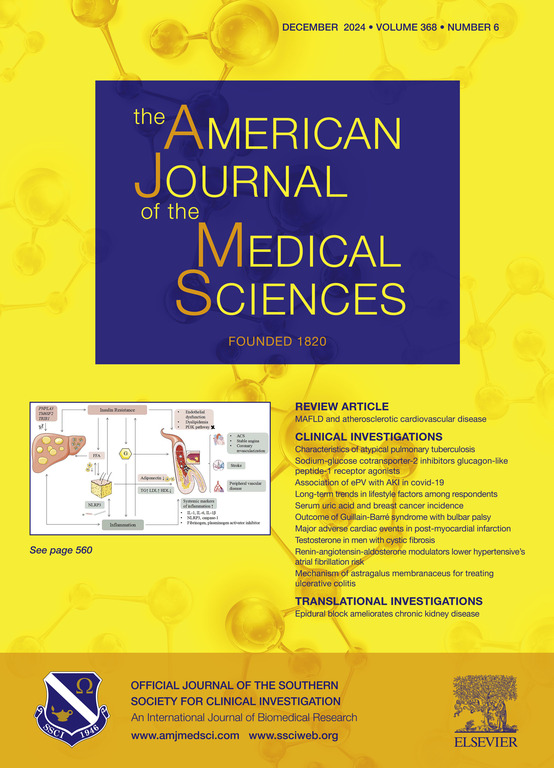Blocking of SIRT7/FOXO3a axis by miR-152-3p enhances cisplatin sensitivity in breast cancer
IF 2.3
4区 医学
Q2 MEDICINE, GENERAL & INTERNAL
引用次数: 0
Abstract
Background
Cisplatin-based chemoresistance is a major obstacle for the treatment breast cancer (BC) including Triple-negative breast cancer (TNBC). SIRT7 is reportedly involved in the progression of BC, the underlining mechanism in Cisplatin-based chemoresistance in BC remains unclear. This work is to elucidate effects of SIRT7 on cisplatin resistance in breast cancer regulated by miR-152-3p.
Methods
The RNA expression of SIRT7 and miRNAs in breast cancer were available from TCGA database. SIRT7-targeted miRNAs were predicted by TargetScan, miRanda, miRDB databases. The association of SIRT7 expression with predicted miRNA was validated by Luciferase assay. Cell apoptosis was determined by Flow cytometry. Cell viability was detected by CCK8 assay. The mRNA expression was measured by quantitative real-time polymerase chain reaction (qRT-PCR) assay. Protein expression was determined by Western blotting assay.
Results
SIRT7 mRNA levels were dramatically enhanced in BC tissues compared to para-carcinoma tissues, also increased in BC patients with Cisplatin-based chemotherapy containing TNBC compared with those without. The increase of SIRT7 expression was obviously relevant to shorter survival time of them. Importantly, SIRT7 inhibition facilitated Cisplatin-induced cell apoptosis of TNBC (MDA-MB-231 and MDA-MB-468) and non- TNBC (MCF-7). Notably, miR-152-3p was predicted as a negative regulator of SIRT7 by overlapping downregulated miRNAs in BC patients treated with Cisplatin-based chemotherapy and miRNAs to target SIRT7. Mechanically, miR-152-3p blocked SIRT7 to stimulate an activation of FOXO3a, cleaved PARP1 and Caspase-3, sensitizing Cisplatin-induced apoptosis of BC cells.
Conclusions
Inhibition of SIRT7 by miR-152-3p may be a promising strategy against the resistance to cisplatin-based chemotherapy in TNBC.
miR-152-3p 阻断 SIRT7/FOXO3a 轴可提高乳腺癌患者对顺铂的敏感性
背景:顺铂化疗耐药是乳腺癌(BC)(包括三阴性乳腺癌(TNBC))的主要障碍。据报道,SIRT7参与了乳腺癌的进展,但其对顺铂类药物的化疗耐药性的基本机制仍不清楚。本研究旨在阐明 miR-152-3p 调控的 SIRT7 对乳腺癌顺铂耐药的影响:方法:SIRT7和miRNA在乳腺癌中的RNA表达来自TCGA数据库。SIRT7靶向的miRNAs由TargetScan、miRanda和miRDB数据库预测。通过荧光素酶试验验证了 SIRT7 表达与预测 miRNA 的关联。细胞凋亡由流式细胞仪测定。用 CCK8 检测法检测细胞活力。实时定量聚合酶链反应(qRT-PCR)测定 mRNA 表达。蛋白表达通过 Western 印迹法测定:结果:与癌旁组织相比,SIRT7 mRNA水平在BC组织中显著升高;与未接受顺铂化疗的TNBC患者相比,SIRT7 mRNA水平在接受顺铂化疗的BC患者中也有所升高。SIRT7表达的增加显然与他们存活时间的缩短有关。重要的是,抑制SIRT7可促进顺铂诱导的TNBC(MDA-MB-231和MDA-MB-468)和非TNBC(MCF-7)细胞凋亡。值得注意的是,在接受以顺铂为基础的化疗的 BC 患者中,miR-152-3p 被预测为 SIRT7 的负调控因子,因为在这些患者中,下调的 miRNA 与靶向 SIRT7 的 miRNA 重叠。从机制上讲,miR-152-3p阻断了SIRT7,从而刺激了FOXO3a、PARP1和Caspase-3的裂解,使顺铂诱导的BC细胞凋亡敏感化:结论:miR-152-3p抑制SIRT7可能是一种很有前景的策略,可用于抑制BC(含TNBC)对顺铂化疗的耐药性。
本文章由计算机程序翻译,如有差异,请以英文原文为准。
求助全文
约1分钟内获得全文
求助全文
来源期刊
CiteScore
4.40
自引率
0.00%
发文量
303
审稿时长
1.5 months
期刊介绍:
The American Journal of The Medical Sciences (AJMS), founded in 1820, is the 2nd oldest medical journal in the United States. The AJMS is the official journal of the Southern Society for Clinical Investigation (SSCI). The SSCI is dedicated to the advancement of medical research and the exchange of knowledge, information and ideas. Its members are committed to mentoring future generations of medical investigators and promoting careers in academic medicine. The AJMS publishes, on a monthly basis, peer-reviewed articles in the field of internal medicine and its subspecialties, which include:
Original clinical and basic science investigations
Review articles
Online Images in the Medical Sciences
Special Features Include:
Patient-Centered Focused Reviews
History of Medicine
The Science of Medical Education.

 求助内容:
求助内容: 应助结果提醒方式:
应助结果提醒方式:


